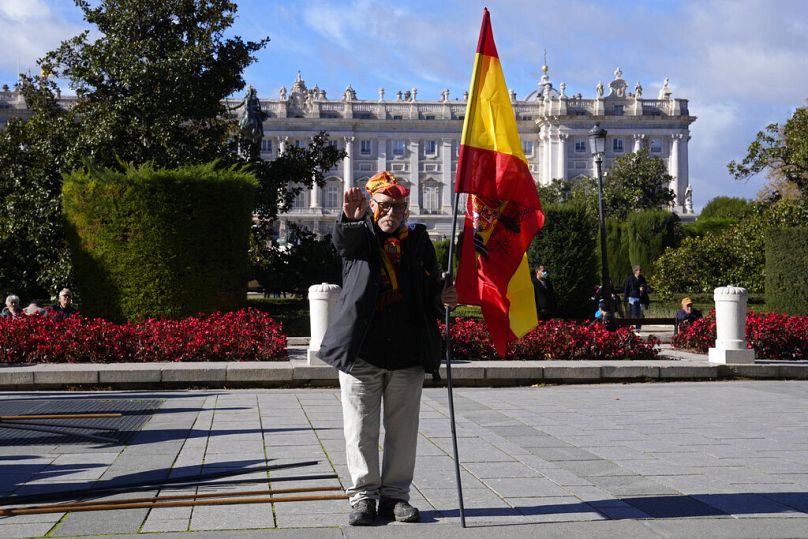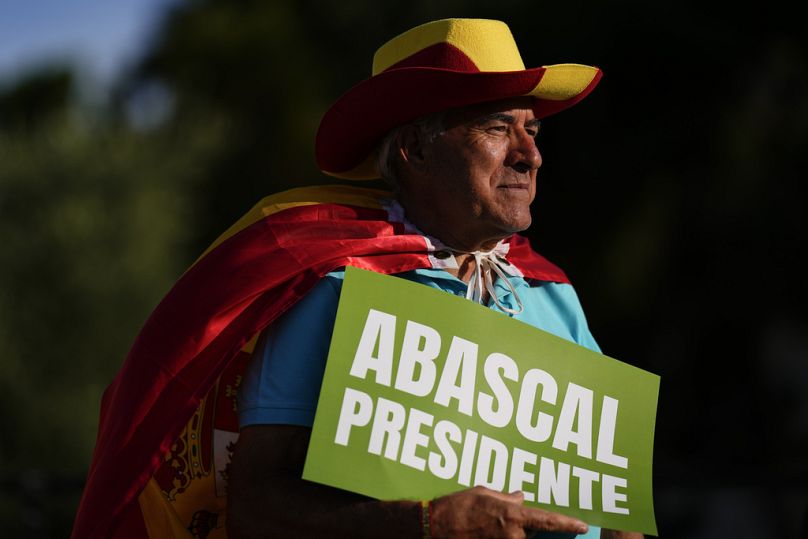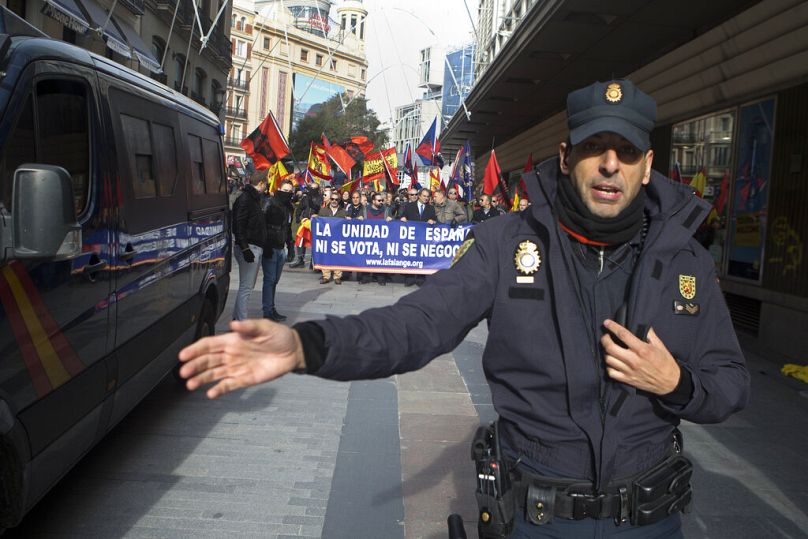Vox is nothing more than a simplified expression of the ideas that were always seen as acceptable by Spain's conservative hardliners, Antonio Maestre writes.
In 1994, former Spanish Foreign Legion Corporal Massimo Testa de Andrés died in Melilla and was buried in the city cemetery of La Purísima.
Testa's real name was Andrea Ghira: he was the infamous Butcher of Circeo and the perpetrator of one of the most violent crimes in Italian history.
There is not a single Italian citizen alive in 1975 who does not remember the photograph of bloodied and beaten Donatella Colasanti being helped out of the boot of a Fiat 127 where Ghira, Gianni Guido and Angelo Izzo had put her together with Rosario López.
The three men kidnapped them, raped them for two days, tortured them, and left them both for dead while they went to have dinner with their families.
They drowned López in a bathtub. Colasanti survived by pretending to drop dead after they struck her with an iron bar.
The crime was known as the Circeo massacre because it took place in the town where these three young men of the Roman bourgeoisie had a villa where they perpetrated the crime.
The three murderers were linked to fascist parties and organisations. They considered the kidnap, rape and murder of two working-class girls good entertainment.
The far-right hooligan Andrea Ghira never served a sentence for these crimes. He took refuge in Spain because all the fascists of the world have always known that it was a safe place for them and their ilk.
Francoism never left the mainstream
Back to the present day: Europe, at least a part of it, has breathed a sigh of relief after seeing the results of the July general elections in Spain, in which the extreme right lost a significant portion of its seats in the parliament and has not managed to enter the government together with the Popular Party (PP) as the polls predicted.
The international press has since dubbed Spain as an anti-fascist bridgehead that has managed to go against the rising influence of the post-fascists on our continent today.
Yet, it did so without delving into the profound particularities of a country that has long metabolised its ideology within the institutions.
In Spain, the ideology that has never been persecuted or sanctioned is not seen as politically incorrect or unacceptable.
In fact, fascism, or its Spanish derivative, Francoism, has undergone a process of institutional integration during Francisco Franco's rule that makes it very difficult for it to stand apart from the mainstream in order to become novel or avant-garde, as it does in other European countries such as Germany or France, where it was persecuted.
A history of letting fascists sleep peacefully
What Germany, France and Italy do have in common is the exile of their leading figures of the criminal extreme right to Spain.
The cemeteries of Madrid are the final resting place of the most distinguished figures of international fascism. Only the leaders of the extreme right who were annihilated by the Partisans or persecuted by the Allies did not fall into eternal sleep in the capital of Spain.
The cases are innumerable, but it is worth mentioning some of these infamous figures in the criminal history of fascism.
Personalities such as Ante Pavelić, the Croatian Nazi Ustaša leader who collected human eyes to decorate the centrepieces of his office tables, Louis Darquier de Pellepoix, the Nazi Vichy collaborationist in charge of Jewish affairs, and Otto Skorzeny, an SS colonel and head of Nazi special operations, passed through Spain, rested, took refuge and led a public and social life.
The collusion of the Spanish state, its dictatorship-derived laws surviving in democracy, a philo-fascist right wing and a social democracy unwilling to carry out a thorough revision of Franco's rule and bring foreign and domestic war criminals to justice made Spain a paradise for any fascist or Nazi in search of a peaceful retirement.
Protections that were forged during Franco's regime continued in a democracy that refused to respect the demands of the countries of origin of the fugitives whenever extradition was requested, justified by the fact that certain crimes were not criminalised in the Spanish legal system.
Those in Europe celebrating that Spain has not fallen prey to the extreme right in the last election do not fully understand that the danger lies not so much in an extreme right that will never get beyond 15% of the vote but rather in a conservative mainstream that is very affectionate to post-fascists because they have always felt close to the same ideas.
Vox only says the quiet part loud
The Spanish conservative right is much more radical than its counterpart in Germany and France for the simple reason that it was formed on the premise of the triumph of its local fascism.
In Spain, they were victorious and have not had to be ashamed of their legacy in the Civil War and dictatorship, whereas, in Germany or France, they were built on the premise of repudiation of a past or confrontation with Nazism in World War II.
The extreme right in Spain had been latent for many years within the PP itself, and Vox is nothing more than a simplified expression of the ideas always seen as acceptable by conservative hardliners.
The likes of Vox's leader Santiago Abascal simply dare to say them out loud and publicly defend them.
And in the run-up to the 2024 European elections, Europe's conservatives, like their Spanish peers, are choosing the same attitude of quiet acceptance of the new far-right parties' fascist ideas.
To put it simply: the European conservative right has learned it cannot defeat the extreme right and has decided to build bridges with them instead.
Europe's conservatives will now take a page out of Spain's book
The European People's Party (EPP) flagbearers, including Italy's Antonio Tajani and Germany's Manfred Weber, have already made strides to integrate fascists into the much larger conservative family. Alberto Nuñez Feijóo would have been one more piece of that movement.
The leader of the Spanish PP wanted Italian Prime Minister and leader of the far-right Fratelli d'Italia Giorgia Meloni to join the EPP, as he made abundantly clear in a joint interview with the newspapers El Mundo and Corriere Della Sera.
Spain is an example in Europe not for what has been celebrated as the brave resistance of PSOE's leader Pedro Sánchez to the rise of the extreme right, but for having been the archetype of a democratic state that has never dealt with lingering fascist ideas in the institutions favouring the impunity of those who committed crimes protected by that criminal ideology.
And if anything, Spain will now serve as the model for how to integrate the extreme right into the mainstream without it being too noticeable.
Antonio Maestre is a journalist and writer. He is a regular contributor to eldiario.es, La Sexta and La Marea, as well as Le Monde Diplomatique and Jacobin. Maestre is the author of books Los Rotos ("The Broken Ones"), Infames ("Infamous"), and Franquismo S.A. ("Francoism PLC").
At Euronews, we believe all views matter. Contact us at view@euronews.com to send pitches or submissions and be part of the conversation.




